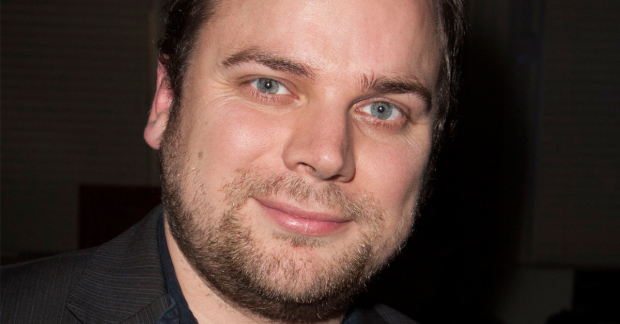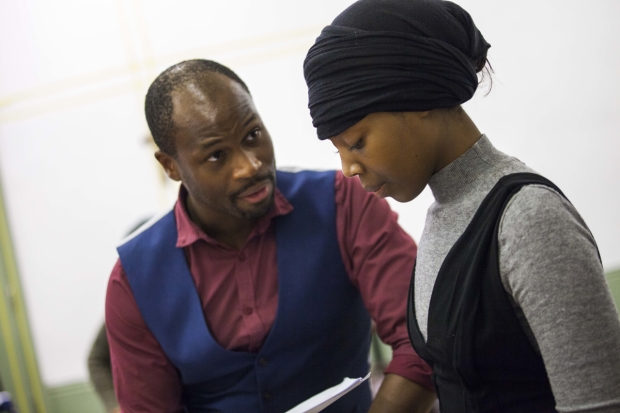Christopher Haydon: I don’t know where I end and The Gate begins
The exiting artistic director of The Gate looks back on his time at the theatre and talks about how his latest directing project deals with the paradoxes of faith

© Dan Wooller for WhatsOnStage
Christopher Haydon took over running the tiny Gate Theatre in west London in 2011. Among the rich, vibrant and diverse plays he’s worked on during his time there, he directed the world premiere production of the astounding play Grounded – a soaring, intense play about a drone pilot – and programmed the European premiere production of Eclipsed – Danai Gurira’s play about five women in the Liberian Civil War. The piece subsequently ran on Broadway and won a Tony Award for Best New Play. During his time at the Gate he has championed new talent and his one-time associate director Ellen McDougall will step into his shoes to run the theatre after he leaves this January. We caught up with Haydon to talk about his last play while artistic director of the Gate – The Convert – the past and his plans for the future.
In the grand scheme of things, five years isn’t that long to be in charge of a venue, was it always your intention not to stay for this amount of time?
Yes. In its 37 year history, if you count Natalie [Abrahami] and Carrie [Cracknell] as one person, I think I am the 11th artistic director of The Gate. That means everyone has had an average of two and a half to five years tenure. I could have stayed as long as I wanted, but I felt three to five years would probably be about right. The Gate is a teaching theatre, it exists to give people the opportunity to learn and to do things for the first time. I had never run a building before; Clare Slater who was my executive director for most of my time there had never been one before; the chair of our board, Joe Smith, is a very experienced commercial producer, but he’s never been the chair of a board before. The Gate is best run by somebody who doesn’t quite know what they are doing.
With a few exceptions, it seems as though artistic directors don’t stay at venues for as long anymore, do you think that’s true?
I think the high turnover in this country is healthy. You have a few that were there for a very long time, like Sam Walters at the Orange Tree, Nick Kent at the Tricycle, often people are there for longer at the National. In America the length of tenure is much longer. I think that’s for various reasons to do with money – the way those places are funded – and healthcare. But the roles are very different in America. If you’re an artistic director in the States, pretty much all your time is spent fundraising. Few artistic directors in the US actually direct as well.
How are you managing to extricate yourself from The Gate?
I love the building so profoundly and I feel like I now don’t know where I end and the building starts. It’s a real emotional process. It is going to be very, very strange [leaving] and it is going to be quite a staggered process because my last official day in the office is the day after our press night for The Convert. But then I will come back to re-open Grounded. You get into a rhythm of having a salaried job as opposed to being a freelancer. You get used to working in a particular way, and being able to do whatever you want within the confines of the programme, so that’s a leap as well.
You seem to have made a conscious effort to support little-known or emerging names while at the Gate…
Absolutely. It made me feel proud going to see Lela and Co. at the Royal Court that Jude Christian directed, having played a significant part in pinging her into that place, or when a year and a half ago when I went into the rehearsal room for Eclipsed. It was basically Caroline Byrne’s first full scale, major show she had directed. And then her Taming of the Shrew at the Globe was such a brilliant production. It’s knowing you played a key role in providing a stepping stone for someone. That is a real thrill.
That is fundamentally what the Gate is for, we want to produce brilliant work but we also want to be a training ground. Rufus Norris started his career at the Gate, Stephen Daldry did. And in The Convert, Mimi Ndiweni is playing the lead. She’s already reasonably established, but she’s never played a big fuck-off lead like this. I can’t claim to have discovered Mimi, but we are certainly giving her a showcase for her extraordinary talents that she hasn’t yet covered.
What else are you most proud of from your time at the Gate?
I think we’ve played a significant role in the conversation about diversity. I embody all the privileges you possibly can as a human being and I am very conscious of that fact. As a result of that consciousness we have worked hard to get exact gender parity with actors in the time I’ve been there and 48 per cent of those actors are BAME. And when you put writers and directors together, it’s an even split gender wise and a third of those are BAME. Clare and I came up with a little addendum that we put on the end of all of our directing contracts which basically urged them to think about casting and to cast as diversely as possible.
The Convert will be your last show at the Gate while still artistic director, tell us about the play.
We produced Eclipsed, which was also written by Danai and was a wonderful play. Danai is hugely impressive both politically and personally and I have always had a big interest in faith. I’m not religious, but my mother is a vicar and I studied theology for my degree so I am a militantly anti-Dawkins atheist. The Convert appealed to me from that perspective but I’ve always been drawn to stories with strong female leads. The Convert has this amazing central role for this young woman who starts being called Jekesai and then changes her name to Ester when she gets converted.

© Iona Firouzabadi
It is a story about colonialism?
Yes, it is set in Rhodesia in the 19th century and it is an all-black cast and what I love about the play is that it deals in contradictions. Danai is a practising Christian in life and she has said she thinks some will read it as anti-Christian. I don’t think it is and she doesn’t think it is, but it is very critical. And I like that paradox between Danai’s own personal faith and the fact that she has put that on trial. It subverts your expectation. I am always excited with how plays can both be true and be completely contradictory.
What’s next for you?
I am going to be doing a book this year, which will be a collection of interviews with artistic directors. The plan is to interview around 20 artistic directors, ten in the UK, ten in the US, which are the places I know the best. There’s almost nothing written about being an artistic director at all. You have Richard Eyre and Peter Hall’s diaries but nothing much written about them. I am also a Clore fellow this year and I have been having a few conversations with venues about projects that I hope will happen in early 2018.
The Convert opens 19 January until 11 February, with previews from now.












